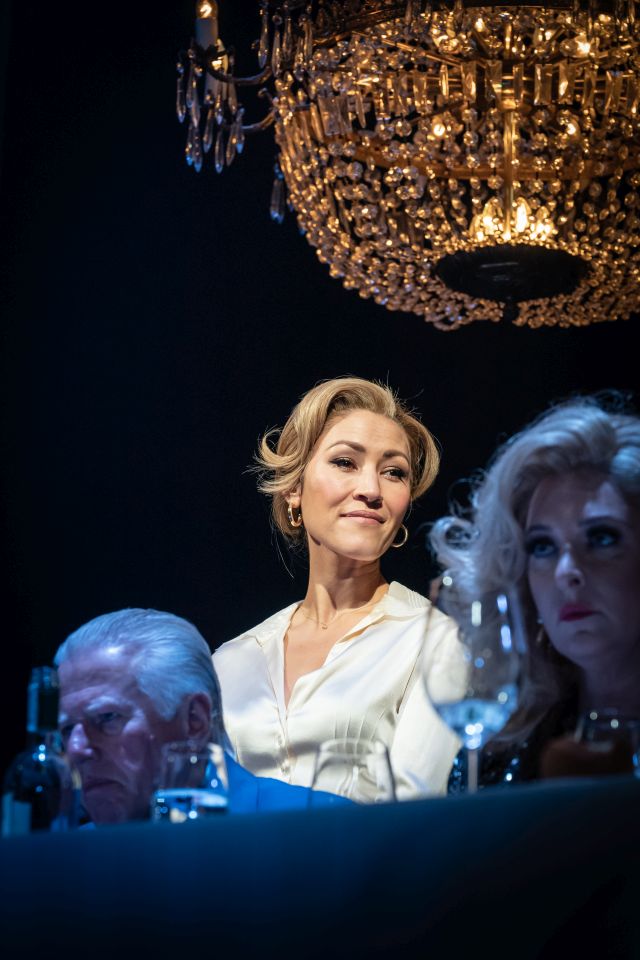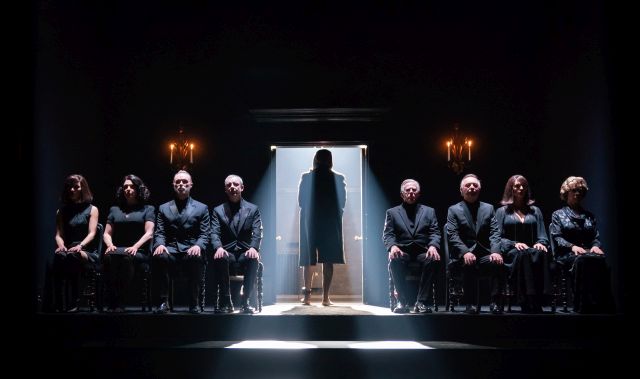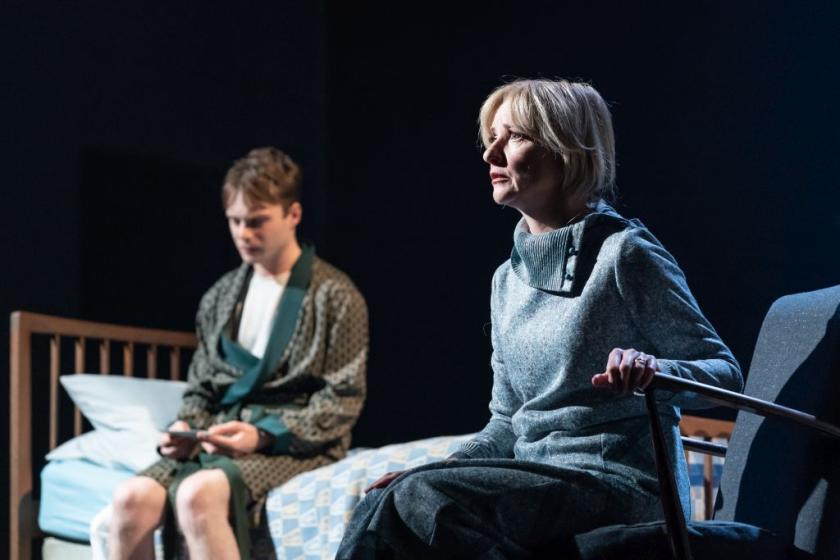The scintillating, commercially bold season of Pinter one-acts at the theatre bearing his name plays a particular blinder with Pinter Five (★★★★★), from which I emerged keen to engage with its mystery and breadth of feeling all over again. Pinter Six (★★★) is worth seeing, as well, and may pay added dividends for those who didn't catch its author's world premiere of his brilliantly spiky play Celebration in 2000 – a production unlikely to be bettered anytime soon.
 Ideally one would catch all these plays in all their combinations, so as to allow connections to be made. A joint viewing of these two latest theatrical amalgams, for instance, makes one newly aware of the role of the outsider – often an intruder – in Pinter's work, whether it's the various folks who come calling on the indrawn couple played by Jane Horrocks and Rupert Graves in The Room or, perhaps, the interjection-prone waiter (Abraham Popoola) in Celebration, whose love of lists finds any number of Pinter precedents, albeit rarely to the degree revelled in here. These two plays were in fact paired under the director's own incisive eye at the Almeida in 2000, so as to allow Pinter's first and last plays to conjoin. And listening to a quavery-voiced Horrocks pay ominous reference in The Room to "foreigners downstairs" is to place this embyronic work on a direct spectrum with the braying swells in Celebration, who eye their waitress (a superb Eleanor Matsuura, pictured above) as some vaguely other being.
Ideally one would catch all these plays in all their combinations, so as to allow connections to be made. A joint viewing of these two latest theatrical amalgams, for instance, makes one newly aware of the role of the outsider – often an intruder – in Pinter's work, whether it's the various folks who come calling on the indrawn couple played by Jane Horrocks and Rupert Graves in The Room or, perhaps, the interjection-prone waiter (Abraham Popoola) in Celebration, whose love of lists finds any number of Pinter precedents, albeit rarely to the degree revelled in here. These two plays were in fact paired under the director's own incisive eye at the Almeida in 2000, so as to allow Pinter's first and last plays to conjoin. And listening to a quavery-voiced Horrocks pay ominous reference in The Room to "foreigners downstairs" is to place this embyronic work on a direct spectrum with the braying swells in Celebration, who eye their waitress (a superb Eleanor Matsuura, pictured above) as some vaguely other being.
Marber's handling of The Room never falters from our first glimpse of Graves, head down, trying to focus on his food while Horrocks prattles away about keeping the cold at bay. What neither of this couple can forestall are visitations of varying degrees of foreboding that include Nicholas Woodeson as a landlord prone to caressing the word "Jewess" and Colin McFarlane as a blind man who coos at Horrocks to "come home", homecomings being a Pinteresque leitmotif well beyond the 1965 play bearing that name.
 Marber's finely-tuned trio takes added wing after the interval, starting with a funny but also implicitly lethal two-hander, Victoria Station, played to perfection by McFarlane as an increasingly enraged taxi dispatcher and Graves (pictured left) as a rather clueless driver who here physically resembles a younger Tom Stoppard and goes by the number 274. The extended sketch takes its title from the cabbie's apparent cluelessness as to the eponymous railway station, when it is in fact a new romance closer to home that may be soaking up what mental energy he has left. By play's end, McFarlane is seen abandoning his perch to make his way towards Graves, and one can only guess at the figurative car crash that awaits as the two men meet.
Marber's finely-tuned trio takes added wing after the interval, starting with a funny but also implicitly lethal two-hander, Victoria Station, played to perfection by McFarlane as an increasingly enraged taxi dispatcher and Graves (pictured left) as a rather clueless driver who here physically resembles a younger Tom Stoppard and goes by the number 274. The extended sketch takes its title from the cabbie's apparent cluelessness as to the eponymous railway station, when it is in fact a new romance closer to home that may be soaking up what mental energy he has left. By play's end, McFarlane is seen abandoning his perch to make his way towards Graves, and one can only guess at the figurative car crash that awaits as the two men meet.
Family Voices, first heard on radio in 1981, emerges as an utterly transfixing discovery that finds the superlative Luke Thallon (late of The Inheritance) penning letters to an increasingly fraught mother (Horrocks), from whom her son seems to be terminally slipping away. The contrapuntal recitations allow Thallon to impersonate the various members of the boarding house he now calls home and introduces Graves late-on as a father seen to be delivering his own "hello out of the dark" – which, come to think of it, is as good a synopsis as any of Pinter's authorial project overall.  The pairing in Pinter Six of Party Time and Celebration makes for a far broader, less nuanced mix, especially as staged by Jamie Lloyd (the visionary curator of this entire season) so that anything subtextual is visible from the start. There's no missing the menace that encircles Party Time (1991), its cast (pictured above) arrayed in funereal black and facing down the audience like so many lambs led to a slaughter of their own insular making. The same, name-heavy ensemble is on fiery and envenomed form in Celebration, a portrait of the ever-permeable membrane separating civility from chaos that in this iteration comes across as Mike Leigh on amphetamines. Whereas Lindsay Duncan and Lia Williams back in the day leant a silken fury to their toxicity, the women on view this time round – Tracy-Ann Oberman, Celia Imrie, a brilliantly snappish Katherine Kingsley – are coiffed and sometimes behave as if on loan from Abigail's Party. Oh, except that the menu at The Ivy – this play's unnamed locale – is unlikely ever to extend to cheese-and-pineapple sticks.
The pairing in Pinter Six of Party Time and Celebration makes for a far broader, less nuanced mix, especially as staged by Jamie Lloyd (the visionary curator of this entire season) so that anything subtextual is visible from the start. There's no missing the menace that encircles Party Time (1991), its cast (pictured above) arrayed in funereal black and facing down the audience like so many lambs led to a slaughter of their own insular making. The same, name-heavy ensemble is on fiery and envenomed form in Celebration, a portrait of the ever-permeable membrane separating civility from chaos that in this iteration comes across as Mike Leigh on amphetamines. Whereas Lindsay Duncan and Lia Williams back in the day leant a silken fury to their toxicity, the women on view this time round – Tracy-Ann Oberman, Celia Imrie, a brilliantly snappish Katherine Kingsley – are coiffed and sometimes behave as if on loan from Abigail's Party. Oh, except that the menu at The Ivy – this play's unnamed locale – is unlikely ever to extend to cheese-and-pineapple sticks.
I miss the pathos underpinning a play that suggests reserves of feeling that have been coarsened by a society keen to fiddle while Rome burns, and to that extent, a thoroughly pre-Brexit play speaks undeniably to our times. But playing an array of mirth-making (or not) couples and the restaurateurs on hand to serve them, a company including Ron Cook, Phil Davis, and Gary Kemp lands laughs of a boisterousness not readily associated with this playwright. And when Popoola halts the gathering aggression to deliver a direct familial reminiscence of his own, the mounting bile abates to be replaced with that quintessentially Pinter landscape known as wonder.
- Pinters Five and Six in repertory at the Harold Pinter Theatre until 26 Jan
- Read more theatre reviews on theartsdesk















Add comment